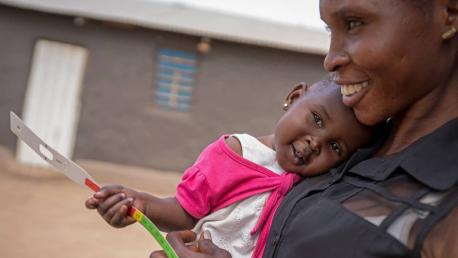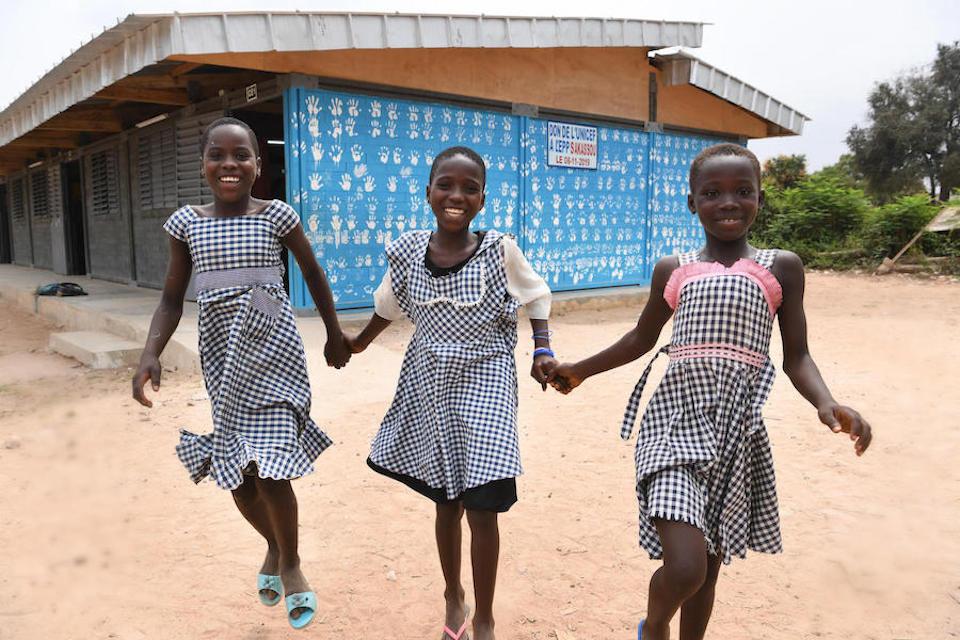
UNICEF in Africa
UNICEF works with partners across the continent to reach children with the support and services they need to stay healthy, educated, protected and respected.
How to help children in Africa
Providing a better future for Africa's children and youth is one of UNICEF's top priorities. And there are many needs and obstacles to overcome. Severe drought and food crises in the Horn of Africa and Sahel regions. Armed conflicts. Displacement. Public health crises.
Many African countries and economies have suffered, and continue to suffer, the effects of violence, climate change, the COVID-19 pandemic and other disease outbreaks — threatening years of progress for children. There is a chronic lack of sustained access to many of the necessities for healthy development: food, safe water, sanitation, education and protection.
To ensure that every child can survive and thrive, UNICEF works to reach them with all the essential services they need to give them the healthy, rewarding and safe childhoods that every child deserves.
Support UNICEF's mission for children in Africa and around the world. Donate today.
Explore UNICEF's work in Africa
UNICEF programming reaches vulnerable children and families in Algeria, Angola, Benin, Botswana, Burkina Faso, Burundi, Cabo Verde, Cameroon, the Central African Republic, Chad, Comoros, Côte d'Ivoire, the Democratic Republic of Congo, Djibouti, Egypt, Equatorial Guinea, Eritrea, Eswatini, Ethiopia, Gabon, Gambia, Ghana, Guinea, Guinea-Bissau, Kenya, Lesotho, Liberia, Libya, Madagascar, Malawi, Mali, Mauritania, Morocco, Mozambique, Namibia, Niger, Nigeria, Rwanda, São Tomé and Príncipe, Senegal, Sierra Leone, Somalia, South Africa, South Sudan, Sudan, Tanzania, Tunisia, Uganda, Zambia and Zimbabwe.
Democratic Republic of the Congo
There are staggering humanitarian needs and protection concerns in the DRC due to violent conflict, insecurity, displacement, flooding and other crises. Millions of children live in precarious conditions, with limited access to safe water, health care and other essential services. UNICEF teams are on the ground, meeting urgent needs. Learn more about UNICEF's work in the Democratic Republic of the Congo.
Libya
Delivering emergency supplies to children and families impacted by the September 2023 floods is just one aspect of UNICEF's mission in the country. Efforts are ongoing to protect and educate children, including children on the move, strengthen the health system and address water scarcity. Learn more about UNICEF's work in Libya.
Mali
Children face many hardships in Mali. A food crisis and malnutrition crisis in the Sahel, followed by a military coup in 2012 and occupation of the north by armed groups have made the situation worse. Increasing food insecurity prompted UNICEF to deploy an emergency response that continues to this day. Learn more about UNICEF's work in Mali.
Nigeria
Aid is needed to help millions of children in Nigeria survive and thrive. Several decades of conflict have raged in the country's north, fueled by a violent campaign by the Islamist militant group Boko Haram. Child and maternal mortality rates are extremely high. Most deaths are from preventable and/or treatable conditions such as malaria, pneumonia and diarrhea. Unsafe water and poor sanitation is a leading factor in many preventable deaths. Learn more about UNICEF's work in Nigeria.
Somalia
Somalia, like other countries in the Horn of Africa, is in the midst of a severe drought, the region's worst in 40 years. Parts of the country are on the brink of famine. Armed conflicts and displacement have left millions of children vulnerable. The global repercussions of the war in Ukraine have been particularly devastating for the country. Learn more about UNICEF’s work in Somalia.
South Sudan
In 2011, South Sudan gained independence from Sudan, but civil war broke out just two years later. This sparked a refugee crisis that remains the world's largest, fueled by armed conflict, economic decline, disease and hunger. There are over 2.3 million South Sudanese refugees, many of whom are women and children, who have fled mainly to Ethiopia, Kenya, Sudan and Uganda. Learn more about UNICEF’s work in South Sudan.
Sudan
Escalating violence in Sudan is putting millions of families at risk. Almost 2.2 million people — including 1 million children — have been displaced across Sudan and to neighboring countries. UNICEF remains on the ground, working with local partners to provide urgently needed supplies and services for children and families. Learn more about UNICEF's work in Sudan.
How to help Africa's children
UNICEF relies on voluntary contributions from donor governments, civil society groups, businesses and others — including individuals — to sustain critical programs and to maximize impact for children in need.
Your tax-deductible contribution can make a real difference. Donate today. Every dollar counts.
Learn more about different ways to give.
Give a child safe water
In emergencies, water supplies often become contaminated, heightening the risks of waterborne illnesses. A UNICEF Inspired Gift of 10,000 water purification tablets can purify a 40,000 liters of water, protecting children and families.
Provide a severely malnourished child with lifesaving treatment
There is a child malnutrition emergency in the Horn of Africa due to severe drought, rapidly rising food prices related to the war in Ukraine and other factors. An estimated 2 million children are suffering from severe acute malnutrition in Ethiopia, Kenya and Somalia.
UNICEF is working with partners to reach more of these children and treat them with Ready-to-Use Therapeutic Food. With a UNICEF Inspired Gift of two months' supply of RUTF, you can restore health and bring back hope for a listless child.
Support children's education
With Africa home to the world’s largest population of children and young people, the time to act to transform education in Africa is now.
Learn more about how UNICEF is tackling learning poverty and how you can help.
